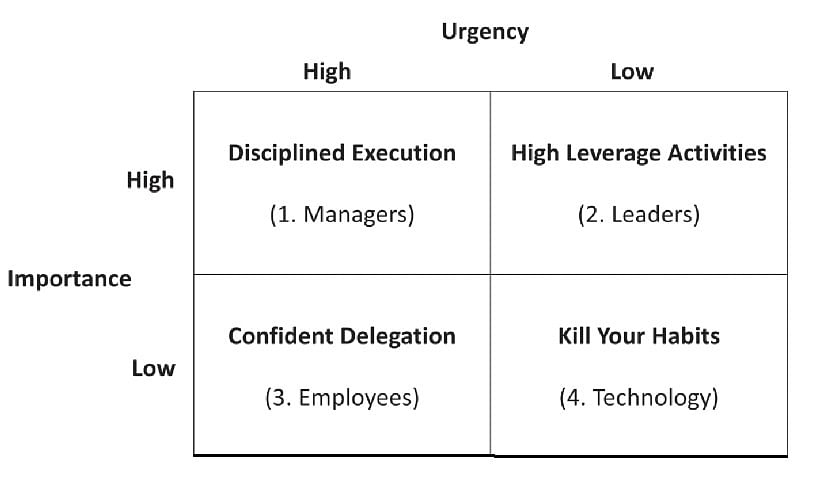
Every activity has two dimensions to it: the challenge it offers and your commensurate skills to be able to carry it out. From a career perspective, you can view your day as a series of tasks, each posing a certain demand, cognitively or viscerally, and then the proficiency with which you address it. The broader your zone of concern, the more you feel confronted, not just by the immediate task but also by the background and other variables you care to consider.
Think of how traffic on the way to your office can hamper your performance, or an avoidable argument with somebody unrelated can unsettle you—all because you are too concerned about too many things. On the other hand, your skills emerge from your zone of influence, things that you know you can affect. It’s worth noticing that both zones are deliberate.
To sum up, your Zone of Concern offers you challenges, whereas your Zone of Influence provides you skills.
The figure here presents an augmented version of the flow channel proposed by Csikszentmihalyi in his landmark work, Flow. The y-axis represents the challenge associated with a task, while the x-axis indicates the skills available to address the task. If a task doesn’t offer sufficient challenge to absorb your attention and skills, you quickly feel bored (think of an average office meeting).
In contrast, an activity that poses a greater challenge and exposes your lack of skills can certainly make you anxious (much like your first week at work). However, if a certain challenge can absorb all your faculties and you are left with nothing else to think of, then you are in the optimal state, called the Flow Channel.
Csikszentmihalyi defines flow as ‘the state in which people are so involved in an activity that nothing else seems to matter; the experience itself is so enjoyable that people will do it even at great cost, for the sheer sake of doing it.’8 Such ‘optimal experiences’ have the following attributes: 1) you have a chance of completing the task, 2) as you are able to concentrate, 3) on a clear goal, 4) which offers immediate feedback, 5) with an effortless involvement, 6) while you retain a sense of control over the actions, 7) where the concern of self disappears, and 8) a sense of duration of time is altered.
In short, a state of flow keeps you occupied enough to lose the sense of time, don’t get tired, and nothing else seems to matter. Your zone of concern thoroughly claims your zone of influence. Or, as Robin Sharma puts it, ‘Being engaged in a pursuit that truly challenges you is the surest route to personal satisfaction.’
Now, here is the key question: On a typical workday, where do you find yourself mostly: anxiety or boredom? I suspect it is largely boredom, punctuated by spikes of anxiety. You oscillate between boredom and anxiety without giving yourself sufficient time to be in the flow channel. The flow happens when you pick up a challenge and then develop skills to overcome the challenge, and before you risk getting bored again, you up the ante by picking up another challenge. Alternatively, if you have developed a skill, get cracking on a task that tests your skill and spiral outwards.
The flow is your calling in life. For me, it is reading, writing and teaching. I lose all sense of time while doing any of these. I feel complete, alive, relevant, refreshed and, above all, purposeful. I am living in the present. Now I understand what Krishnamurti meant when he said, ‘Living in the present is the instant perception of beauty and the great delight in it without seeking pleasure from it.’ The flow itself is pleasurable and not what it brings about.
Delegate with confidence
I have encountered hundreds of managers and even a few leaders. I often ask them this question: When you delegate, what is your objective: 1) getting the work done as per your expectations, or 2) getting the work done? Most managers choose the first option, whereas leaders settle with the ‘work done’. There is little doubt they are there for a reason.
Effective delegation is the sine qua non of leadership. If you struggle with delegation, you not only do not allow people below you or around you to grow, but you also sever your own growth prospects.
The art and science of delegation are as critical for first-time managers as they are to entrepreneurs, for you can only go so far riding on your calibre. And frankly, why are you the most suitable? You ought to give others a chance. That’s your Employees Quadrant (refer to image). Most employees get delegated to. So, here we look at how to delegate effectively.
You must delegate the task if you realise something is not important for you but is urgent for the system. There could be three types of delegation: upward, sideward and downward. Let’s revisit the question: What would you want? —1) getting the work done as per your expectations, or 2) getting the work done? If you think the work must be done as per your standards, then you are mistaken on prioritisation. You better do it yourself if it must meet your standards. If you are choosing to delegate, make the standards impersonal.
Imagine you delegate 100% of an activity to somebody. Then, how much of your time is freed up? A 100% pertaining to that activity. And what do you do with that time? You perform disciplined execution of things that matter to you or invest in high-leverage activities. Most people fail to delegate not because they distrust others but because they don’t know what to do with their freed-up time. Ergo, they remain parasitic to their work.
(Excerpts from Design Your Career, a book by the author, who is an innovation evangelist by profession and a teacher by passion)